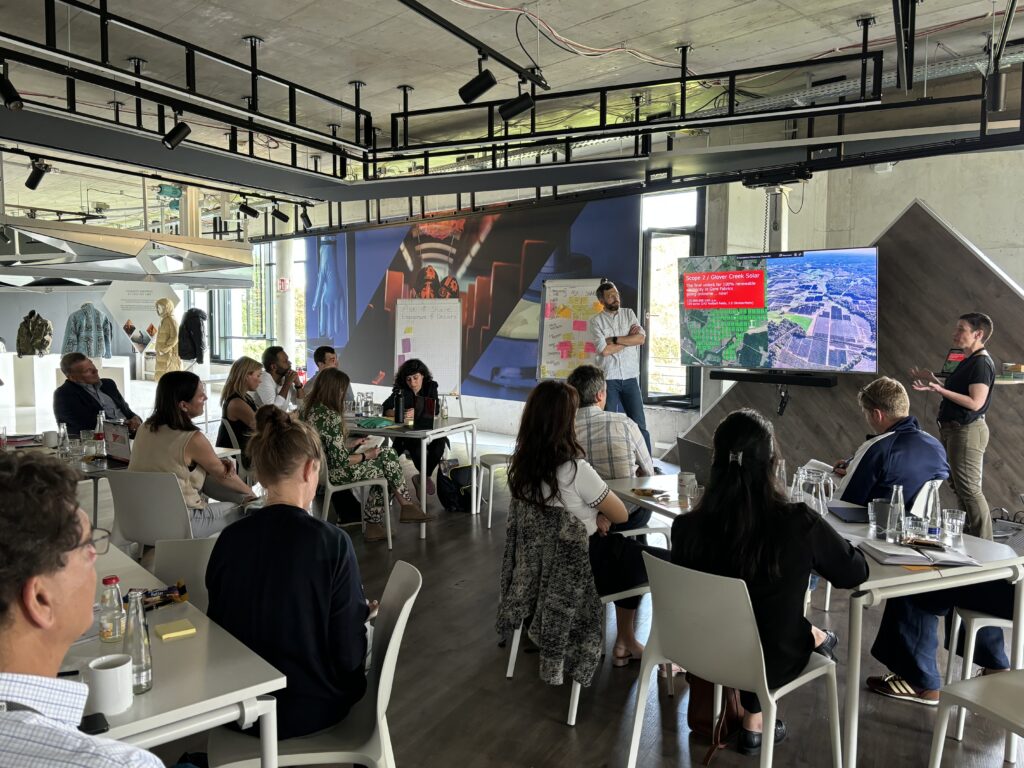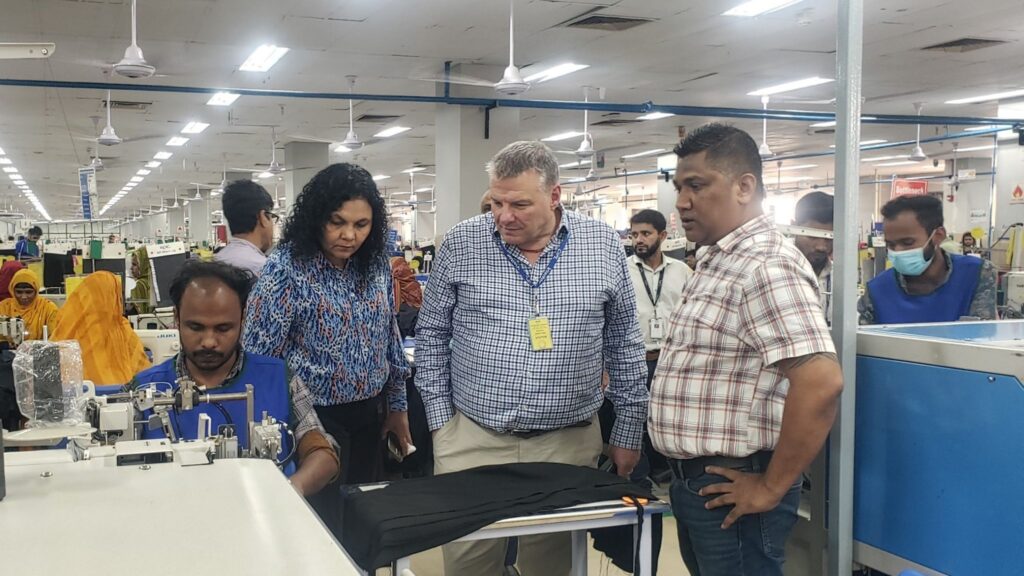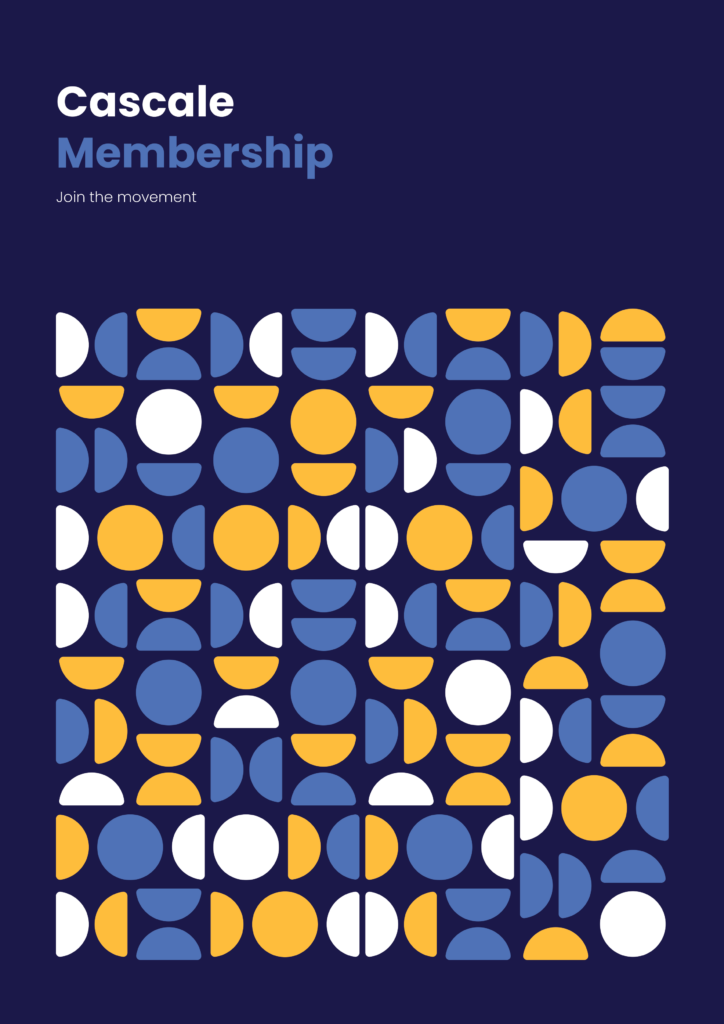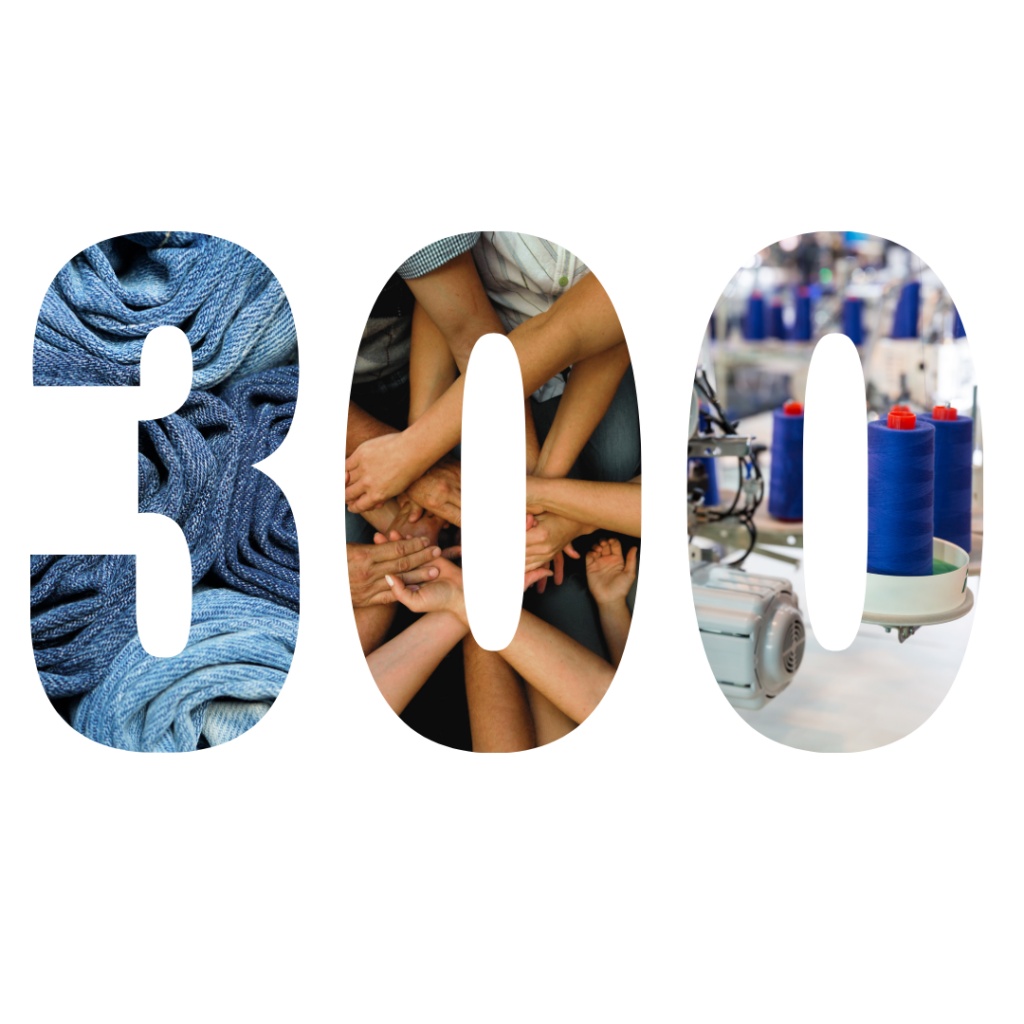
Dear Fashion: Let’s Step Up and Get Aligned
In a recent opinion editorial with WWD, CEO Colin Browne argues fashion needs to take more serious and coordinated action on sustainability. Read the highlights here!

Cascale, formerly known as the Sustainable Apparel Coalition, is thrilled to announce the addition of three new members in the second quarter of 2024. Committed to driving collective action towards a more sustainable, equitable, and restorative consumer goods industry, Cascale represents over 300 organizations worldwide. The organization’s membership spans various sectors, including apparel, footwear, textiles, home furnishings, outdoor sporting goods, and bags and luggage.
Please join us in welcoming Cascale’s new members of Q2 2024
Through Cascale membership, organizations across the consumer goods value chain gain access to the Higg Index, impactful collective action programs, member-exclusive training and events, and a thriving network of industry leaders, innovators, and sustainability advocates.
Be part of a global alliance committed to a sustainable future. Together, members can drive impactful change in the consumer goods industry. Click here to explore Cascale membership.
Members of Cascale’s global community gathered for regional events across Southern Europe, DACH (Germany, Austria, and Switzerland), Hong Kong, and Shanghai.

Recently, members of Cascale’s global community gathered for regional events across Southern Europe, DACH (Germany, Austria, and Switzerland), Hong Kong, and Shanghai. These events highlight the power of collaboration and the value of membership in fostering innovation and sustainability in the industry.
Southern Europe Regional Member Event: Barcelona, Spain
May 28, Desigual HQ
The Southern Europe Regional Member Event, held at Desigual HQ in Barcelona, saw the participation of ten Cascale members, including Desigual, Tendam, Mango, Recover, Mayoral, Teddy, Camper, OVS, Benetton, and El Corte Ingles. The event was marked by a warm welcome from Alberto Ojinaga, CEO of Desigual, who emphasized, “The way to compete in the future will be through collaboration.”
Highlights of the event included insightful knowledge sharing and discussion focusing on traceability through Higg FEM insights and harnessing Higg BRM value. Additionally, a comprehensive tool evolution roadmap was co-presented by Worldly and Cascale, detailing the Higg Product Tools roadmap.
DACH Regional Member Event: Munich, Germany
June 6, Gore Fabrics HQ
The DACH Regional Member Event, hosted at Gore Fabrics HQ in Munich, brought together seven members, including Puma, Gore Fabrics, Lenzing, Sympatex, Hugo Boss, Jack Wolfskin, and Marc O’Polo. Achim Loffler, Gore’s strategy and business operations leader, kicked off the event by stressing the importance of integrated sustainability and business strategies.
Members shared valuable insights on using Higg FEM analytics and data for impact and decarbonization. The event also featured an open discussion on the future of regional collaboration, with attendees outlining key topics for future initiatives.
UK Regional Brand Member Event: London, United Kingdom
June 25, Sainsbury’s HQ
The UK Regional Brand Member Event, hosted at Sainsbury’s HQ in London, brought together 13 brands and retailers, including Cascale members Sainsbury’s, ASDA, Avon, Boohoo, Dunelm, Gymshark, John Lewis, M&S, New Look, Next Plc, Rapha, and River Island.
Highlights of the event included valuable insights on navigating legislation and compliance regulations leveraging the Higg Index suite of tools, harnessing the Higg Product Tools, a Higg Index tool roadmap by Cascale and Worldly, and discussions about Tier 2 overlap analyses.
Cascale & Worldly Shanghai Afternoon Social: Shanghai, China
June 27, Li & Fung HQ
The Shanghai Regional Member Event, hosted at the Li & Fung campus in Shanghai, brought together several Li & Fung suppliers and 20 Cascale member representatives. Ed Lam, board executive director of Li & Fung and CEO of LFX, started with a welcome address stating the importance of collaboration between Cascle, Worldly, and LFX.
Attendees had the unique opportunity to meet and connect with Colin Browne, chief executive officer at Cascale, and Scott Raskin, chief executive officer at Worldly. Key topics discussed included alignment of the Higg Index tools with regulations and ESG compliance, performance ratings for sustainable finance, Higg Index verification, and purchasing practices and relationships between brands and manufacturers. View the event photo gallery
Hong Kong Regional Member Event: Hong Kong, China
July 2, Cascale Hong Kong office
Following the Cascale Manufacturer Forum in Shanghai, the Hong Kong Regional Member Event was held for the second year at the regional Cascale office. The event brought together 21 member organizations, including Crystal Group, TAL Apparel, QIMA, ESTS, and GAP Inc.
The event included a fireside chat with Cascale’s new CEO, Colin Browne, and Andrew Martin, executive vice president at Cascale, followed by a Manufacturer Climate Action Program (MCAP) presentation from Joyce Tsoi, senior director of the decarbonization program. Additionally, Crystal Group, a Cascale manufacturer member since 2012, shared their journey with Cascale and the Higg FEM. Discussions focused on driving impact, amplifying manufacturers’ voices, and addressing industry needs such as support for Scope 3 science-based targets and upcoming regulations. The event concluded with an Ask Me Anything session and a networking reception.
These regional events underscore the critical role Cascale plays in convening members to share insights, best practices, and innovative solutions. By bringing diverse voices across the industry together, Cascale fosters a collaborative environment that drives progress towards its shared vision of a global consumer goods industry that gives more than it takes — to the planet and its people. The value of membership lies not only in the access to Cascale’s Higg Index tools and resources but also in the strength of its global community.
Not yet a Cascale member? Click here to learn more about becoming a member.
Andrew Martin, EVP at Cascale, traces his visit to Hong Kong-based manufacturer Epic Group’s CIPL facility in Bangladesh showcasing sustainable innovation and a responsible future ahead.


It’s one thing for a company to talk about their sustainability commitments, and it’s another thing entirely to show them off – and invite someone into their production lines for a closer look.
In Bangladesh earlier this year, I had the privilege of touring Cascale member Epic Group’s CIPL facility. Like Cascale, Hong Kong-based manufacturer Epic Group is committed to improving the way they do things. This commitment, or “Relentless Pursuit of Better” as they’ve called it, equates to a sizable impact across their 200 production lines and 9 facilities (to the tune of 120 million garments per year)! Since 2005, they have continued to push their standards in delivering value-added, world-class manufacturing in apparel that favors quality, value, and sustainable innovation.
What is Epic Group’s innovation exactly? During my tour, I saw how continued investment in new factories and technology pays for itself in the long haul. I witnessed the first-hand investments made in automation, RFID-based production tracking, worker performance systems, and upgraded laundry machines. I also observed their state-of-the-art Effluent Treatment Plant, which meets Zero Discharge of Hazardous Chemicals (ZDHC) aspirational discharge standards and reuses 50 percent of treated effluent back into operations. This is essential given the uphill battle of wages, energy, and data costs. More important than ever is standardization, accelerating away from proprietary requests and moving towards convergence.
So what does that mean at an assessment level? I had really great robust conversations with Vidhura Ralapanawe, (Epic Group’s executive vice president, Sustainability & Innovation and Cascale Board Director) and the team, and we all agreed that assessments need to adapt to the times, meaning satisfying standardized industry-wide accepted reporting requirements while adapting to current and upcoming regulations. However, beyond this it was clear that further expectations should be razor focused only on setting up factories for improvements over time, while avoiding the addition of unnecessary burdens sometimes often imposed by individual companies that don’t add value to performance improvement. After all, this is at the very core of Cascale’s origin story.
We had productive discussions on Epic Group’s ongoing sustainability journey and future goals to halve their water and carbon footprints by 2030.
Because let’s not forget – this year is a pivotal year. We can’t tolerate climate commitments falling by the wayside. Scientists warned of surpassing critical limits, and February marked a year-long trend of global temperatures above the 1.5-degrees Celsius according to the European Union’s Copernicus Climate Change Service. It’s why the efforts of global manufacturers like Epic Group matter and must be complemented by collective efforts across people and planet.
Though I’ve seen many factories in my 30-year career in global textile supply chains – from development of Olympic and World Cup-winning performance fabrics to operational improvements in factories – this tour left me with deeper inspiration.
I’m excited about how Cascale and Epic Group can continue to collaborate to raise sustainability standards across the apparel industry through collective action with brands, manufacturers, and other stakeholders – including elected officials. With the European Union’s recent approval of the Corporate Sustainability Due Diligence Directive (CS3D), which is a positive step forward, I am motivated to see how responsibility becomes the norm.

In the first quarter of 2024, Cascale, formerly the Sustainable Apparel Coalition, proudly welcomed 11 new members to its global membership community. With a mission to catalyze collective action toward an equitable and restorative consumer goods industry, Cascale continues to expand its reach, now comprising over 300 organizations worldwide.
Please join us in recognizing Cascale’s new members of Q1 2024
Cascale stands as a global, non-profit alliance of 300 leading consumer goods brands, retailers, manufacturers, sourcing agents, service providers, trade associations, NGOs, and academic institutions. Representing every link of the global value chain, Cascale members co-create solutions to today’s biggest social and environmental challenges.
Together, Cascale members shape a more equitable and restorative future for the consumer goods industry and the planet. Operating in apparel, footwear, and textiles; home furnishings; sporting and outdoor goods; and bags and luggage, members have access to a global network of industry leaders, innovative tools like the Higg Index, and collaborative opportunities that drive transformative sustainability.
Be part of a global alliance committed to a sustainable future. Together, we can drive impactful change in the consumer goods industry. Click here to learn more about becoming a member.
Discover the possibilities of becoming a member of Cascale, formerly Sustainable Apparel Coalition (SAC), by downloading our membership brochure. Take the first step towards unlocking valuable benefits, industry insights, and a supportive global community.


San Francisco, Amsterdam, Hong Kong – January 22, 2024: The Sustainable Apparel Coalition announced a significant milestone today, welcoming its first member in Korea, Hansoll Textile Ltd. New members, like Hansoll, reflect ongoing efforts to elevate APAC manufacturing voices, which are critical to the SAC’s mission of industry transformation.
“We are thrilled to celebrate the milestone of expanding our reach to Korea with new member Hansoll,” said Andrew Martin, executive vice president of the SAC. “As we demonstrate our commitment to engage more manufacturers in the APAC region, we are honored and humbled by new members that demonstrate their leadership by joining us in industry transformation across the consumer goods industry.”
Founded in 1992, Hansoll Textile Ltd. is a leading global textile company, specializing in the manufacturing and export of knit apparel to the United States, Europe, and Japan. Over the past 30 years, they have achieved a remarkable 200-fold increase in revenue and continue improving their marketing and design capability and investing in owned manufacturing and the world’s best smart factory. As a forward-thinking organization, Hansoll Textile actively responds to evolving market demands by spearheading the transformation of the global digital value chain through a digital platform. Committed to sustainability, they practice green management to contribute to a sustainable future and actively embrace ESG-focused work processes to meet corporate social responsibility.
“As one of the biggest manufacturers in the world, Hansoll Textile is committed to active engagement in ESG-focused management. Joining the SAC provides a pivotal opportunity to align with global sustainability standards,” said Diana Oh, Senior Manager, CSR/Sustainability at Hansoll Textile, a new SAC manufacturer member. “Our SAC membership will significantly benefit Hansoll Textile by enhancing our sustainability practices and integrating us more deeply into the global sustainability textile community. Leveraging SAC’s resources, we aspire to enhance our corporate social responsibility initiatives, broaden our expertise, and set new benchmarks in sustainable manufacturing within the global textile industry. Our SAC membership symbolizes our dedication to shaping a more sustainable and responsible future for the textile industry.”
Now reflecting over 300 members around the world, the SAC doubled the number of manufacturing members in 2023, as compared to the previous year. And, in response to calls from members, the organization began expanding its membership to the adjacent product categories of home furnishings, sporting and outdoor goods, and bags and luggage.
— ENDS —
About the Sustainable Apparel Coalition
The Sustainable Apparel Coalition (SAC) is a global, non-profit alliance of over 300 organizations in global apparel and consumer goods. Initially formed to create standardized sustainability metrics, the SAC has sharpened its focus to driving pre-competitive, collective action across three foundational pillars. As an independent entity, the SAC brings together brands, retailers, manufacturers, NGOs, academics, and industry associations to combat climate change, ensure decent work, and contribute to a nature-positive future. Central to the SAC’s mission is the Higg Index, a suite of comprehensive tools that empower members to measure, evaluate, and improve sustainability performance across the supply chain. To support evolving industry needs, the SAC also brings together a focus in policy, transparency, and programs for collective action.

San Francisco, Amsterdam, Hong Kong – November 21, 2023: In October, the Sustainable Apparel Coalition (SAC) reached a milestone: Over 300 members are now part of the organization. This includes 27 new members in 2023 alone!
When Walmart and Patagonia joined forces with other key value chain partners in 2009, their vision was to develop a common approach to measuring sustainability. Little did they know that 14 years later the group they founded would represent nearly 50 percent of the apparel and textile industry across 36 countries.
The SAC’s mission is now more critical than ever. The organization is intent on transforming business for exponential impact through groundbreaking programs and tools, collaborative partnerships, and trusted leadership on industry sustainability. And this work remains anchored by the tools that the original group pioneered: The Higg Index, which measures social and environmental impact from materials in products, to how those products are made, to brand practices.
“Diamond Fabrics Limited is proud to join the SAC community, and we believe that our SAC membership will play a pivotal role in advancing our sustainability initiatives,” said Saqib Shahzad, head of sustainability, at Pakistan-based textile manufacturing company Diamond Fabrics Limited of Sapphire Group, a new member. “We are committed to actively contributing to the shared vision of creating a consumer goods industry that gives back to the planet and its people. We look forward to collaborating with like-minded organizations to drive positive change.”
“At Dunelm, we remain as ambitious as ever about being a company that focuses on growing sustainably. This has meant combining long-term thinking with shorter term, achievable, and measurable goals,” commented Christina Downend, head of climate change at Dunelm, a candidate member in home furnishings, a new adjacent product category for the SAC. “The SAC global community and Higg Index tools have helped us on that journey, not least as we develop initiatives such as our Better Manufacturing program, where we are supporting and engaging our suppliers on their own transitions to net zero. Our goals cannot be met without collaboration and we are excited to be part of this community, to share knowledge and ideas so that we all make progress to fulfill our ambitions.”
“The Sustainable Apparel Coalition is a collaborative organization that aims to promote sustainable practices in the apparel and footwear industry,” said Jack Duan, director of sustainability solutions at GreenPont, a new SAC member. “Joining the coalition allows GreenPont to share best practices, collaborate on research and development, and collectively drive positive change within the industry. Being part of SAC is a strategic move for GreenPont looking to align its business practices with sustainable and responsible principles, and to contribute to a more environmentally and socially conscious industry.”
Over the past four years, the SAC has doubled its membership and today, there are more than 24,000 Higg Index users worldwide, facilitating comparable sustainability reporting. During that same time, the team has tripled — and capacity has grown accordingly, building and sustaining partnerships with industry leaders including Apparel Impact Institute, Textile Exchange, ZDHC Foundation, Worldly, SLCP, The Industry We Want, and Global Fashion Agenda, among others.
“While many hands were hard at work behind this 300-plus member milestone, it is important we acknowledge the hard work and dedication driven at the ground level by the membership development team,” said Andrew Martin, executive vice president of the SAC. “It can take months of engagement behind the scenes to ensure prospective members get the information they need before joining a mission-focused organization like the SAC. From there, a mutually extensive vetting process is taken on by both parties. We could not be more grateful for the growth we’ve achieved in the name of industry improvement and want to, again, extend a warm welcome to our newest members.”
For 14 years, the SAC has focused on systems change, working collaboratively across supply chains in order to move the industry from silos to collective action. Its new strategic plan further defines these goals, refocusing on combating climate change, ensuring decent work, and contributing to a nature-positive future in order to deliver impact at scale.
– ENDS –
About the Sustainable Apparel Coalition:
The Sustainable Apparel Coalition (SAC) is a global, non-profit alliance of over 280 organizations in the apparel, footwear, and textile industry. Initially formed to create standardized sustainability metrics, the SAC has sharpened its focus to driving pre-competitive, collective action across three foundational pillars. As an independent entity, the SAC brings together brands, retailers, manufacturers, NGOs, academics, and industry associations to combat climate change, ensure decent work, and contribute to a nature-positive future. Central to the SAC’s mission is the Higg Index, a suite of comprehensive tools that empower members to measure, evaluate, and improve sustainability performance across the supply chain.

New model provides greater opportunity for companies to understand their impact and commit to working towards a more responsible textile and apparel industry
San Francisco, Amsterdam, Hong Kong – March 16, 2023: The Sustainable Apparel Coalition (SAC), has launched a new membership model for companies with a revenue of over $100 million to encourage more in the industry to work towards including sustainability as part of their business.
The new Candidate membership model will offer businesses insight into what it means to be a full SAC member, and provide clarity on the expectations of members to help them better determine if their company’s sustainability goals align with those of the SAC and its global membership. It will create greater opportunities for companies to engage with the SAC and gain support on their sustainability journeys.
As a Candidate member, businesses will have access to the SAC membership community, the Higg Platform and all five Higg Index tools that together assess the social and environmental performance of the value chain and the environmental impacts of products, including the Higg Facility Environmental Module (FEM), Higg Facility Social & Labor Module (FSLM), Higg Brand & Retail Module (BRM), Higg Materials Sustainability Index (MSI), and Higg Product Module (PM).
All companies who express interest to become a Candidate member will be evaluated by the SAC on certain criteria including suitability, commitment, goals, and abilities. The new Candidate membership will allow companies access for up to two years, following which they will be required to transition into full membership at the SAC.
Andrew Martin, Executive Vice President at the SAC said: “We are delighted to introduce the Candidate membership model and for the opportunity to engage with more companies. We believe it presents a great opportunity to further expand the SAC’s reach within the apparel and footwear industry while also creating opportunities to expand our reach into adjacent sectors within the consumer goods industry to drive further progress and deliver greater impact. As a global convener of almost half the apparel and footwear industry, we believe the reach and diversity of our members is our most powerful lever for collective action and providing greater inclusivity for all sizes of businesses is critical if we are to move the industry forward.”
Erlinda Lee, Senior Manager, Global Membership Development at the SAC said: “We are excited to launch the Candidate membership model that offers a pathway to SAC membership for medium to large companies committed to positively impacting people and the planet. We recognize that not all businesses are at the same stage of the journey, and hope that through this membership model, more companies can better understand how they can introduce and implement initiatives to accelerate their sustainability journey.”
Indira Chauhan, Senior Ethical Manager at George@Asda said: “George at Asda is excited to join the SAC under their new Candidate model membership. This will give us a great opportunity to collaborate with other members and with the help of SAC’s Higg Index tools, it will enable us to further strengthen and drive sustainability improvements throughout our supply chain too.”
Michelle Herfeldt, Sustainability Manager, Tchibo said: “Tchibo is excited to join the SAC as the first Candidate member. In the journey towards net-zero we are at a time where the industry needs to increase efforts to bring down GHG emissions to reach the 1,5 °C target. The collection of primary and standardized data is essential to increase our efforts towards environmental challenges in our supply chains. Solutions need to be tailor-made and adapted to the specific and individual needs of our partners.
Knowing the majority of our suppliers are already using the SAC tools, we can seize the opportunity to connect with them and jointly implement measures that help build a sustainable, safer and environmentally-friendly production. The Candidate membership gives us the chance to be part of the community while at the same time have the flexibility to evaluate the tools’ applicability for our business before adapting them at full scale.”
To inquire about SAC membership, contact the SAC’s Membership Development team. For more information on the new Candidate membership and other membership types, please download our Membership Brochure.
– ENDS –
About the Sustainable Apparel Coalition:
The Sustainable Apparel Coalition (SAC) is an independent and impact-creating organization that aims to lead the industry toward a shared vision of sustainability based upon a joint approach for measuring, evaluating, and improving performance.
As a non-profit organization, it has members from across the apparel, footwear and textile sector, but exists independently outside any one company so that it can drive progress. The SAC’s collective action efforts bring more than 280 global brands, retailers, manufacturers, NGOs, academics and industry associations together. They represent about half of the apparel and footwear industry along the whole supply chain – from sustainability pioneers to organizations just getting started.
Before the SAC existed, organizations worked in a siloed way, using their own programs and measurements that lacked standardization and an ability to drive collective action. In 2009, Walmart and Patagonia identified this as a serious problem. Joining forces, they brought together peers and competitors from across the sector, to develop a universal approach to measuring sustainability performance and founded the Sustainable Apparel Coalition.

New guide supports the textile and apparel industry in committing to science-based targets and delivering against validated SBTs
San Francisco, Amsterdam, Hong Kong – March 06, 2023: The Sustainable Apparel Coalition (SAC), as an impact-driven global convener of around half of the apparel and footwear industry, today launches its Decarbonization Guide for Members. The Guide is part of the SAC’s Decarbonization Program, launched last year, to drive science-based targets (SBTs) adoption and reduction in emissions across the textile and apparel industry. The Guide provides a six-step process by which organizations can commit and set SBTs and develop action plans to deliver individual targets.
Responsible for between two and eight percent of annual global greenhouse gas (GHG) emissions, the textile and apparel industry must ramp up its efforts on facilitating collective action across the industry, to deliver the 45 percent reduction needed by 2030 to limit global warming to 1.5°C. As part of the guidance provided, organizations will need to obtain internal buy-in to commit to and set SBTs, and submit their targets for verification. Once approved, member organizations will be required by the SAC to communicate their targets within six months of approval, develop an action plan and start taking actions geared towards delivering on carbon reductions. The SAC will require its corporate members to set near-term emission reduction targets in line with the latest climate science within 24 months and obtain the appropriate validation from SBTi or a third-party accredited organization.
Featuring comprehensive guidance and resources to help organizations set and achieve their SBTs in each step, the Guide forms part of the ongoing work between the SAC and its members, including best-practice sharing webinars and peer-to-peer learning sessions, in an effort to scale up collaborative solutions to address the climate crisis. Developed last year in collaboration with Michael Sadowski, one of the primary authors of the Apparel and Footwear Sector Science-Based Targets Guidance by the World Resources Institute (WRI) in 2019, the SAC has been working on refining the guidance and conducting peer-to-peer group meetings with members to understand their needs and expectations.
Amina Razvi, Chief Executive Officer at the Sustainable Apparel Coalition, said: “Right now, the textile and apparel industry is not on track to hit net zero by 2050. We need urgent transformation and increased collaboration across the industry to tackle the worst impacts of climate change. The launch of our Decarbonization Guide is a major step in our efforts to create an aligned pathway for the industry to reduce GHG emissions. We believe through continued collaboration and partnership with organizations such as the Science Based Targets initiative, we can support our members to commit and set their science-based targets and work collectively to deliver on emissions reduction targets.”
Joyce Tsoi, Director of Collective Action Programs, at the Sustainable Apparel Coalition, said: “Through the Decarbonization Program, we are enabling collaboration between brands and manufacturers to address one of the biggest challenges the industry faces: how to reach net zero. With the textile and apparel industry being so far away from reaching net zero by 2050, the need for urgent action has never been greater. This Guide is a critical marker on that journey and will empower member organizations to turn purpose into practice to deliver necessary impacts, starting from understanding and adopting targets in line with the best available science to developing action plans to take collective actions. 77% of our members participating in our decarbonization program told us that they want to share knowledge, resources and tools that are available to them to set science-based targets is their biggest priority. By giving the industry the guidance, tools and platform it needs to change, brands and manufacturers are equipped to tackle the urgent challenge of emission reductions and drive systemic change across the industry.”
Luiz Amaral, CEO of the Science Based Targets initiative (SBTi), said: “When it comes to tackling the biggest problem the world has ever seen – climate change – we must draw on the power of collaboration, ambition and innovation. This new guidance is proof that the fashion industry is up to the challenge. It also provides a blueprint for other sector trade bodies to follow.
“To keep 1.5°C within reach, remain economically competitive and enable the transformation to a global net zero future, setting science-based targets is the crucial first step. I am looking forward to this collaboration driving countless companies to set ambitious climate goals and deliver tangible emission reductions in line with science.”
As part of its commitment to collaboration with stakeholders in the industry, the SAC is engaging with organizations such as the Science Based Targets initiative (SBTi) on how it accelerates the SBT adoption and validation across the globe. Dedy Mahardika, SBT Engagement Manager for Southeast Asia and Oceania at CDP presented at the SAC Annual Meeting in Singapore last November on the status of SBT adoption and the SBT guidance alongside the SAC to encourage greater uptake.
As part of its strategic plan, the SAC has set an aspirational objective to mitigate climate change and build climate resilience in the consumer goods value chain by supporting its corporate members in achieving decarbonization.
– ENDS –
About the Sustainable Apparel Coalition:
The Sustainable Apparel Coalition (SAC) is an independent and impact-creating organization that aims to lead the industry toward a shared vision of sustainability based upon a joint approach for measuring, evaluating, and improving performance.
As a non-profit organization, it has members from across the apparel, footwear and textile sector, but exists independently outside any one company so that it can drive progress. The SAC’s collective action efforts bring more than 280 global brands, retailers, manufacturers, NGOs, academics and industry associations together. They represent about half of the apparel and footwear industry along the whole supply chain – from sustainability pioneers to organizations just getting started.
Before the SAC existed, companies worked in a siloed way, using their own programs and measurements that lacked standardization and an ability to drive collective action. In 2009, Walmart and Patagonia identified this as a serious problem. Joining forces, they brought together peers and competitors from across the sector, to develop a universal approach to measuring sustainability performance and founded the Sustainable Apparel Coalition.
About the Science Based Targets initiative
The Science Based Targets initiative (SBTi) is a global body enabling businesses to set ambitious emissions reductions targets in line with the latest climate science. The SBTi’s goal is to accelerate companies across the world to support the global economy to halve emissions before 2030 and achieve net-zero before 2050.
The initiative is a collaboration between CDP, the United Nations Global Compact, World Resources Institute (WRI) and the World Wide Fund for Nature (WWF) and one of the We Mean Business Coalition commitments. The SBTi defines and promotes best practice in science-based target setting, offers resources and guidance to reduce barriers to adoption, and independently assesses and approves companies’ targets. www.sciencebasedtargets.org